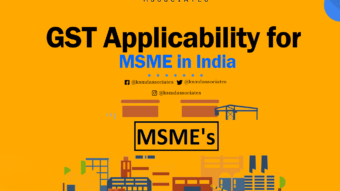The Goods and Services Tax (GST) is a single indirect tax that was introduced in India on July 1, 2017. It replaced a number of existing taxes, such as excise duty, VAT, and service tax.
The GST is applicable to all businesses, including MSMEs. However, there are some special provisions for MSMEs under the GST law.
Who is an MSME?
An MSME is a Micro, Small, or Medium Enterprise. The criteria for classifying an enterprise as an MSME are based on its turnover and investment.
- Micro enterprise: Turnover up to Rs. 20 lakh
- Small enterprise: Turnover up to Rs. 50 crore and investment up to Rs. 10 crore
- Medium enterprise: Turnover up to Rs. 250 crore and investment up to Rs. 50 crore
GST Applicability for MSMEs
The GST applicability for MSMEs in India is based on their annual turnover. MSMEs with an annual turnover of up to Rs. 40 lakh (Rs. 20 lakh in special category states)goods Rs.20 lakh for services are not required to register for GST.
However, they can voluntarily register for GST if they want to avail of the benefits of the GST regime.
The GST is applicable to all MSMEs, except for the following:
- MSMEs that are engaged in the supply of exempted goods or services
- MSMEs that are engaged in the supply of goods or services that are subject to the composition scheme
Exempted Goods and Services
There are a number of goods and services that are exempted from GST. These include:
- Basic necessities such as food, clothing, and medicines
- Educational and medical services
- Services provided by government and non-profit organizations
Composition Scheme
The composition scheme is a simplified GST registration scheme that is available to MSMEs. Under the composition scheme, MSMEs are required to pay GST at a flat rate of 1%, 2%, or 6%, depending on the type of goods or services they supply.
Benefits of GST for MSMEs
The GST has a number of benefits for MSMEs, including:
- Input tax credit (ITC): MSMEs can claim ITC on the GST they have paid on inputs. This can help to reduce their tax liability.
- Increased market access: GST can help MSMEs to expand their market reach by making it easier for them to sell their goods and services across India.
- Reduced compliance burden: The GST is a simpler tax system than the previous taxes, which has reduced the compliance burden for MSMEs.
- Increased transparency: The GST is a more transparent tax system, which has made it easier for MSMEs to understand their tax obligations.
- Increased competitiveness: The GST has made it easier for MSMEs to compete with larger businesses, both domestically and internationally.
However, there are also some challenges for MSMEs under the GST regime. These include
- High compliance cost: The GST compliance cost can be high for MSMEs, especially for those who are not familiar with the GST regime.
- Complexities of the GST law: The GST law is complex and can be difficult to understand for MSMEs.
- Lack of awareness: There is still a lack of awareness about the GST regime among MSMEs.
Overall, the GST applicability for MSMEs in India is a positive development. However, there are some challenges that MSMEs need to be aware of.
Here are some additional things to keep in mind for MSMEs under the GST regime:
- MSMEs can avail of the composition scheme under GST. This scheme allows MSMEs to pay GST at a flat rate of 1% to 6%, depending on the type of business activity.
- MSMEs can claim input tax credit on the GST they have paid on inputs. However, they need to keep proper records to claim ITC.
- MSMEs need to file GST returns on a monthly or quarterly basis, depending on their turnover.
- MSMEs can get help from GST consultants to understand and comply with the GST regime.
GET EXPERT ADVICE
With Expert Guidance
document.getElementById( "ak_js_1" ).setAttribute( "value", ( new Date() ).getTime() );
Conclusion
The GST is a complex tax system, but it has a number of benefits for MSMEs. MSMEs should carefully consider whether to register for GST and whether to opt for the composition scheme. They should also consult with a tax advisor to understand their specific tax obligations under the GST law.
I hope this blog post has been informative. Please let me know if you have any other questions.
If you have any questions about GST, please consult a tax expert. You can also visit the GST website for more information.
Additional Resources:
- Government of India GST website: https://www.gst.gov.in/
- GST Council website: https://www.gstcouncil.gov.in/
- GST helpline: 1800 425 6666


Add a Comment